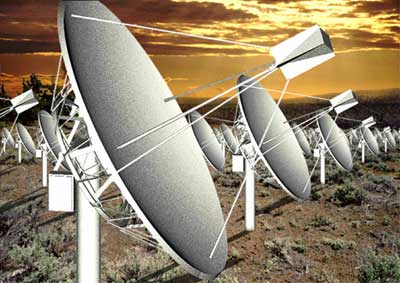The economic alienby Gregory Anderson
|
| Much of the SETI community tend to assume the only reason any civilization would develop space technology is to do scientific research. At some point, however, a technological civilization confined to one planet will likely be driven to look into space for energy, resources, new manufacturing opportunities, and more. |
In essence, then, The Park Hypothesis is only applicable to civilizations that have developed a technological base capable of supporting spaceflight. How likely is it that a civilization would go so far technologically, and decide to go no further? We don’t know. Speculating, however, we can fairly surmise that a technological base able to throw robots into space, for example, will also have begun to transform society. Production of industry will have reached a formidable level. The material wealth of the society may have begun an historic boom. Science will have begun to ask more interesting, more profound questions than ever before. Advanced robotic probes imply powerful, tiny computers, which would open an array of possibilities. The quality of medical care might well be on the rise. Would a society in that situation decide to push no further?
There is also a more fundamental economic principle that would eventually exert itself. Mr. Park and much of the SETI community tend to assume the only reason any civilization would develop space technology is to do scientific research. At some point, however, a technological civilization confined to one planet will likely be driven to look into space for energy, resources, new manufacturing opportunities in different gravity fields or in different physical environments, and more. Could off-planet economic development be accomplished using only robots in space? Perhaps. To be efficiently accomplished, however, those robots would need to be extraordinarily advanced from the start of space development activities. Otherwise, a motivated, educated member of that race would be able to do much more on site, much faster.
Once a race had routine access to an orbit of its home planet, it would also have easy access to the rest of its home solar system, at least in terms of energy requirements. A capability to visit sister worlds would evolve from the development of an ability to live in space for long periods for economic reasons. Would every race in that situation fly to other planets, and eventually to other stars? Who knows? Fermi’s famous question might suggest other species have stayed home, but Fermi was a physicist, not an entrepreneur.
If economic realities would tend to drive a technological civilization into space and eventually to the stars, where are they? That answer has eluded us for fifty years, but fifty Earth years is no time at all in the history of the universe.
